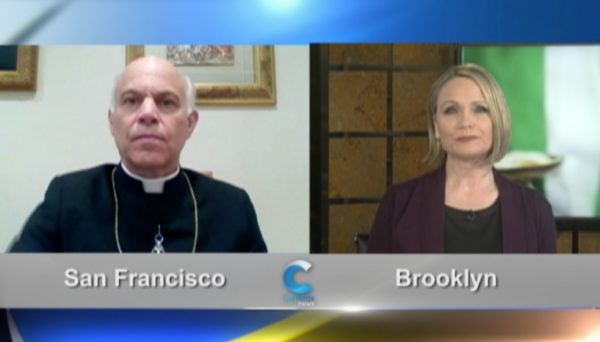WINDSOR TERRACE — Archbishop Salvatore Cordileone of San Francisco doubled down on his stance that Catholic public figures who support abortion rights should be barred from receiving Communion while at the same time pleading with them to have a change of heart.
“Please stop the killing. This is killing innocent human life,” Archbishop Cordileone told Currents News on Monday. “You have a very prominent position in society. You can influence societal attitudes and practices. You’re in a position to stop the killing.”

The comments come about a week after Archbishop Cordileone published a pastoral letter on the topic, as the Communion debate continues to grow since President Joe Biden, the country’s second Catholic president and a pro-abortion Democrat, took office.
[Related: Archbishop in SF Says No to Communion for Pro-Choice Catholics]
“Please recognize the evil for what it is. Please have a change of heart and come back to the fullest of your Catholic faith,” he continued. “We await you with open arms to welcome you back.”
The pastoral letter, “Before I Formed You in the Womb I Knew: A Pastoral Letter on the Human Dignity of the Unborn, Holy Communion, and Catholics in Public Life,” published on May 1, is also significant because House Speaker Nancy Pelosi, another pro-abortion Catholic Democrat, resides in his archdiocese.
On Monday, he declined to comment about Pelosi, other than to reiterate that according to Canon law, the local bishop has the power to decide whether or not someone can receive the Eucharist.
Archbishop Cordileone did, however, respond to Bishop Robert McElroy of San Diego, who has been vocal that denying Biden or other political leaders Communion would be “very destructive.”
“I do not see how depriving the President or other political leaders of Eucharist based on their public policy stance can be interpreted in our society as anything other than the weaponization of the Eucharist,” Bishop McElroy said in February.
Bishop McElroy doubled down on his comments last week, telling America Magazine that “the Eucharist is being weaponized and deployed as a tool in political warfare.”
Archbishop Cordileone rebuked the notion that the stance is political.
“This is not a political motive for me. I intentionally waited until after the election to release [the pastoral letter] so it would not be misinterpreted as a political move,” Archbishop Cordileone said. “One could also say that those who are against applying the church’s discipline are doing so for political reasons.”
In Archbishop Cordileone’s interview with Currents News, he also noted that the pastoral letter was the best way to address a very secularized culture in San Francisco and clarify “the key points about worthiness for holy Communion and what the abortion issue really is and cooperation and the special responsibility of Catholics in public life.”
“We have this kind of incognizance now and Catholics not understanding what it means to receive Communion,” Archbishop Cordileone said. “Many Catholics have a more protestant notion that it’s more like table fellowship, but it means Christ’s sacrifice was made present to us. We unite our sacrifice with Christ.”
“So, receiving Communion is that by which we profess that we believe what the church believes and we’re living our life accordingly,” he added.
On Monday, the Vatican’s Congregation for the Doctrine of the Faith also got involved. Catholic News Service (CNS) reported that Cardinal Luis Ladaria, congregation prefect, wrote a letter to the United States Conference of Catholic Bishops President Archbishop José Gomez of Los Angeles, which urged the U.S. Bishops to be cautious with discussions of creating a national policy on the topic.
According to CNS, the letter was in response to a letter from Archbishop Gomez informing the doctrinal congregation that the bishops were preparing to address the situation of Catholic politicians and their worthiness to receive Communion.
